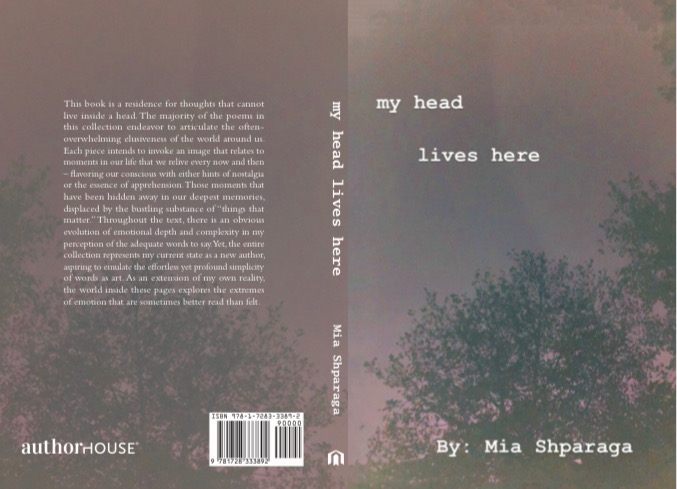Growing up, I was a huge fan of going to Barnes & Noble with my mother. There were books, toys, games, events I would attend with my elementary school friends — even a little café inside the branch near my house. As a college student, the appeal of the bookstore has decreased. But when I found out a University of Maryland student’s poetry book is sold there, I was intrigued and impressed.
Mia Shparaga, a junior government and politics major, published her first collection of poetry, My Head Lives Here, at the end of October. The book contains 50 poems, detailing Shparaga’s existential thoughts of love, loss, traveling and everything else, well, living in her head. It’s for sale through Barnes & Noble, available as a hard copy and e-book.
The whole collection is written in a stream-of-consciousness way, and none of the poems are titled. Each poem is different, but flows smoothly right into the next one. At first, I didn’t like that the poems were untitled. But once I made it to the middle of the book, I realized they weren’t really needed.
While the collection of poetry is ready to be purchased and read, Shparaga said she never thought her work would get published. She said writing is always something she’s done for therapy and self-expression.
[Read more: Photo essay: At the 9:30 Club, Clairo proved her music is even better live]
“I kind of like that it’s an ongoing thought. You never really title your thoughts,” Shparaga said.
There are some poems that connect to moments in the writer’s life and there are others that are pretty thoughts, just stringing together words that sound good together, Shparaga said. One of my favorite lines, a beautiful string of words, was: “Tip-toeing on the roof of adolescent / Certainty / That I have it all planned out.”
Shparaga insisted she wasn’t trying to keep anything a mystery throughout the collection. However the reader wanted to interpret her lines is what she intended it to be.
Even the dark images of heartbreak, drugs and anxiety in My Head Lives Here are up for interpretation. Shparaga hadn’t necessarily experienced all of the dramatic issues she wrote about, but chose certain words and images for the beauty of the words, she said.
“I don’t do drugs. I’ve never done drugs — but I think that everything in your life could be a drug,” Shparaga said. “It can have so many meanings to so many different people.”
[Read more: How can I be perfect like every journalist on Twitter with a blue checkmark?]
The existential but concrete thoughts Shparaga had would resonate with a lot of people my age. A line that stuck out to me was: “But I want to live, I don’t just want to be alive / Because G-d didn’t put us here to die.” I imagine the question of purpose would hit home for many college students.
The way Shparaga talked about her poetry was refreshing; she emphasized there is no one interpretation or point to her collection. Her therapeutic process was writing, she said, hoping her readers would experience the same relief, whether it be by relating to it or being inspired by it.
It’s cool to see a fellow student have their work published and out there in the world. Every day I seem to discover new and exciting talent at our school, and Shparaga’s My Head Lives Here is a great example of this.



